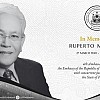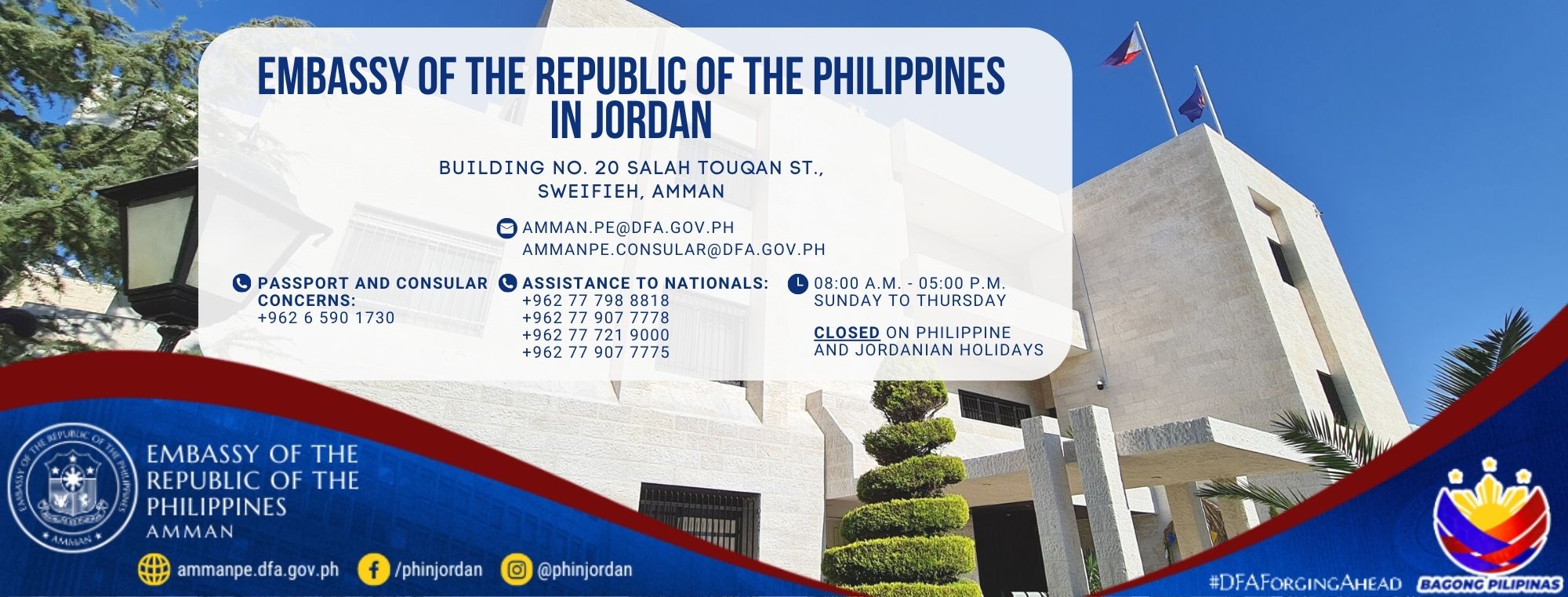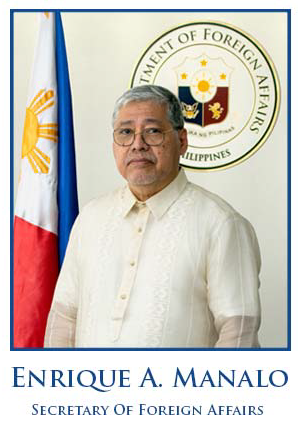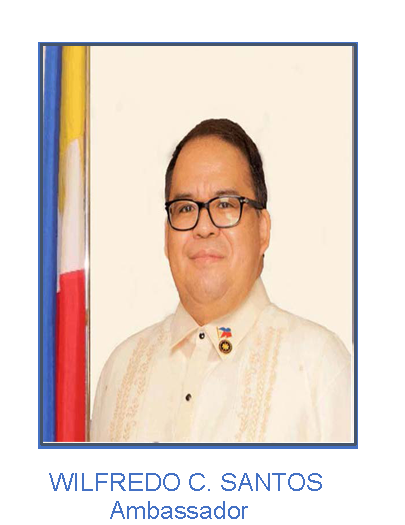Embassy News
 In Loving Memory of Ambassador Ruperto M. Dizon
The Philippine Embassy in Amman mourns the passing of Ambassador Ruperto M. Dizon, a distinguished Filipino diplomat whose career was marked by dedication to public service. He was the 4th Philippine Ambassador to the Hashemite Kingdom of Jordan with concurrent jurisdiction over the State of Palestine. He was 85 years old.
Ambassador Dizon...
In Loving Memory of Ambassador Ruperto M. Dizon
The Philippine Embassy in Amman mourns the passing of Ambassador Ruperto M. Dizon, a distinguished Filipino diplomat whose career was marked by dedication to public service. He was the 4th Philippine Ambassador to the Hashemite Kingdom of Jordan with concurrent jurisdiction over the State of Palestine. He was 85 years old.
Ambassador Dizon... - Sunday, 25 May 2025 Philippine Embassy in Jordan Participates in "One Run Through Jordan" Marathon
- Monday, 19 May 2025 Philippine Embassy in Jordan Successfully Implements Online Voting for Overseas Filipinos in 2025 National Elections
- Thursday, 15 May 2025 Filipino Students Highlight Mindanao Cuisine at International Cultural Exhibit in Mutah University
Announcement
- Friday, 09 May 2025 Request for Quotation No. 4 - Lease of Venuew for the National Day with Filipino Community
- Wednesday, 05 March 2025 INVITATION TO BID - Disposal of Used Mercedes Benz E280, 2009 Model
- Sunday, 09 February 2025 Request for Quotation No. 01-2025 _ Procurement of One (1) Unit of Official Motor Vehicle
There are four different situations for individuals who wish to get married, all of which require some form of consular service for the intended marriage to proceed:
- Both parties are Filipino citizens who intend to have their marriage ceremony at the Embassy solemnized by a duly commissioned Consular Officer;
- Both parties are Filipino citizens who intend to have their marriage ceremony solemnized by a duly authorized local (i.e. Jordanian or Palestinian) civil or religious official;
- Between a Filipino citizen and a foreign national who intend to have their marriage ceremony solemnized by a duly authorized local (i.e. Jordanian or Palestinian) civil or religious official;
- Between a foreign national and a Filipino citizen who intend to have their marriage ceremony solemnized by a duly authorized civil or religious official in the Philippines
Important: Under Philippine law, a marriage may only be recognized if it satisfies the following requisites:
- Legal capacity of contracting parties who must be a man and a woman;
- Consent freely given in the presence of an authorized solemnizing officer (e.g. Consular Officer of the Embassy or local religious or civil authorities)
- A marriage ceremony that takes place with the appearance of the contracting parties before the authorized solemnizing officer before whom, and in the presence of at least two witnesses of legal age, they declare that they take each other as husband and wife
Applicable Fees
- JOD 18.750 (USD 25.00) for Certificate of Legal Capacity to Contract Marriage
- JOD 18.750 (USD 25.00) for Application for Marriage License
- JOD 45.000 (USD 60.00) for Solemnizing Fee
- JOD 18.750 (USD 25.00) for Marriage Certificate
Forms to Use
These forms may be downloaded and used only if you have Adobe Acrobat Reader installed on your computer. After download, you may either:
- fill in the required information and then print out the completed form; or
- print out the form and fill in the required information by hand
Note: It is recommended that you use A4-size paper. Information entered directly into the form cannot be saved, so make sure that you can print out the completed form at once.
Requirements and Procedures
- Marriage between Filipino citizens to be solemnized at the Embassy
- Marriage between Filipino citizen and foreigner to be solemnized in foreign country
- Marriage between foreigner and Filipino citizen to be solemnized in the Philippines
If the foreign contracting party and the Filipino contracting party intend to get married in the Philippines, they are to submit all documentary requirements instead to the Civil Registrar of the municipality or city in the Philippines where the marriage is to take place upon their application for a marriage license.
Requirements for the Foreign Contracting Party
To save time and avoid any major inconveniences, the foreign contracting party is advised to make sure that the following requirements are ready before traveling to the Philippines:
- Original birth certificate (with official English translation if in other language) of foreign contracting party duly authenticated by the Ministry of Foreign Affairs of his or her country and this Embassy's Consular Section;
- Certificate of Legal Capacity to Contract Marriage to be issued by the Embassy or Consulate in the Philippines of the foreign contracting party; and
- Written consent of first wife (if foreign contracting party is a previously married Muslim man) duly notarized and authenticated by the Ministry of Foreign Affairs and/or Embassy of foreign contracting party in Jordan
It is also advisable that the foreign contracting party prepare certified true copies (with English translations if necessary) of his or her passport, national identification card, and family book. Originals must also be brought along during the trip to the Philippines.
Procedures
- Once the foreign contracting party has arrived in the Philippines, he or she shall apply with the Filipino contracting party for a marriage license at the Civil Registrar of the place where the marriage is to take place;
- The marriage license is not required for those who are getting married under the Islamic faith;
- Please note that not all religious officials (e.g. priests, imams, rabbis, ministers) are authorized to solemnize marriages, but only those who are registered with the Civil Registrar-General;
- Keep in mind also that issuance of the marriage license has to comply with the ten (10) day publication period; and
- Finally, note that the requirements presented here pertain only to the civil aspect of marriage under Philippine law and that those who intend to have a church wedding or marriage rites under other religions may have to comply with additional requirements.
A Filipino citizen who intends to marry a foreigner should first determine with the appropriate civil or religious authority what the documentary requirements are under the marriage laws in the country where the marriage will take place.
The foreign contracting party (especially if not a citizen of the country where the marriage will take place) should also ensure that proper documentary requirements that apply to him or her are complied with to avoid any delay in the intended marriage.
Both contracting parties must inquire first with the local civil and/or religious authorities empowered to solemnize marriages on the local requirements and procedures before coming to the Embassy's Consular Section.
Requirements
In most countries, a Filipino citizen has to prove that he or she has the legal capacity to contract marriage. To substantiate this declaration under oath, the following are to be submitted to the Consular Section:
- Philippine passport as proof of Philippine citizenship;
- Birth Certificate issued by the National Statistics Office (NSO) on security paper and authenticated by the Department of Foreign Affairs as proof that Filipino citizen is at least eighteen (18) years of age;
- Certificate of No Marriage Record (CENOMAR) also issued by the NSO and authenticated by the DFA;
- Two (2) identical 3.5 cm x 4.5 cm photos that comply with the following:
- taken with white background
- taken within last six (6) months
- showing full front view of applicant's face
- applicant in decent attire (with collar and sleeves);
- preferably without glasses (or if with glasses, must have no reflections);
- male applicant should have no earrings
- Additional requirements for special cases
- Court Decision on Annulment for any contracting party who was previously married and whose marriage was subsequently annulled by a Philippine court (copy of court decision with NSO-registered marriage contract containing marginal note regarding annulment and also authenticated by the DFA);
- Death Certificate of deceased spouse for any contracting party who is a widow or widower (must also be NSO-issued and DFA-authenticated).
- Affidavit of Consent executed by the father, mother, surviving parent or guardian, or person having legal charge of any contracting party who is between the ages of eighteen (18) and twenty-one (21), pursuant to Article 14 of the Family Code of the Philippines;
- Affidavit of Parental/Guardian Advice upon the intended marriage executed by any parent or legal guardian of any contracting party who is between the ages of twenty-one (21) and twenty-five (25), pursuant to Article 15 of the Family Code of the Philippines.
- For the foreign contracting party
- Photocopy of passport and/or national identification card; and
- Document attesting to legal capacity to contract marriage issued by the relevant civil authority of his or her country and authenticated by the Ministry of Foreign Affairs and the Embassy/Consulate of foreign contracting party in Jordan;
- Written consent of first wife (if foreign contracting party is a previously married Muslim man) duly notarized and authenticated by the Ministry of Foreign Affairs and/or Embassy of foreign contracting party in Jordan; and
- Two (2) identical photographs (3.5cm x 4.5cm) of foreign contracting party
Procedures
If the Filipino contracting party has complied with the documentary requirements specified above, he or she can then obtain a Certificate of Legal Capacity to Contract Marriage by following the procedures below:
- Execute an affidavit on his or her legal capacity to contract marriage, which declares under oath all relevant personal circumstances and requests the issuance of the Certificate of Legal Capacity to Contract Marriage (LCCM);
- Submit to the Consular Section the requirements for the foreign contracting party as specified above;
- The Consular Section shall post the particulars of the Filipino contracting party requesting the LCCM and that of the foreign contracting party on the bulletin board of the Embassy for ten (10) consecutive days; and
- After the prescribed publication period has lapsed, and if no information is received pertaining to possible impediments or disqualifications, the Consular Section shall then issue the Certificate of Legal Capacity to Contract Marriage.
Note: The Certificate of Legal Capacity to Contract Marriage is only valid for a period of one hundred and twenty (120) days and shall be deemed automatically cancelled after this period has lapsed
Article 7 and Article 10 of the Family Code of the Philippines grants authority to a Consul General, Consul, or Vice Consul of the Republic of the Philippines to serve as solemnizing officer in the marriage between two Filipino citizens. The duly commissioned consular officer is likewise empowered to perform the duties of the local civil registrar in respect to the issuance of the marriage license prior to solemnization and registering the marriage after it has been solemnized.
However, this fact notwithstanding, Filipino citizens may decide to have their marriage ceremony solemnized instead by a duly authorized civil or religious official in their country of residence.
Requirements for Marriage License
The first step that two Filipino citizens must complete in order to contract marriage and have the marriage solemnized by a duly commissioned consular officer is for them to secure a marriage license (or certificate of legal capacity to contract marriage if they plan to get married before a local civil or religious official authorized under the laws of the country they reside in) by submitting the following documents to the Consular Section:
- Philippine passport as proof of Philippine citizenship;
- Birth Certificate issued by the National Statistics Office (NSO) on security paper and authenticated by the Department of Foreign Affairs as proof that both parties are at least eighteen (18) years of age;
- Certificate of No Marriage Record (CENOMAR) also issued by the NSO (with annotation stating that it was issued for the purpose of contracting marriagen abroad) and authenticated by the DFA;
- Two (2) identical 3.5 cm x 4.5 cm photos that comply with the following:
- taken with white background
- taken within last six (6) months
- showing full front view of applicant's face
- applicant in decent attire (with collar and sleeves);
- preferably without glasses (or if with glasses, must have no reflections);
- male applicant should have no earrings
- Additional requirements for special cases
- Court Decision on Annulment for any contracting party who was previously married and whose marriage was subsequently annulled by a Philippine court (copy of court decision with NSO-registered marriage contract containing marginal note regarding annulment and also authenticated by the DFA);
- Death Certificate of deceased spouse for any contracting party who is a widow or widower (must also be NSO-issued and DFA-authenticated).
- Affidavit of Consent executed by the father, mother, surviving parent or guardian, or person having legal charge of any contracting party who is between the ages of eighteen (18) and twenty-one (21), pursuant to Article 14 of the Family Code of the Philippines;
- Affidavit of Parental/Guardian Advice upon the intended marriage executed by any parent or legl guardian of any contracting party who is between the ages of twenty-one (21) and twenty-five (25), pursuant to Article 15 of the Family Code of the Philippines.
Important: If parental consent is not granted or parental advise is unfavorable, the marriage license may only be issued three (3) months after the prescribed ten (10) day publication period of the application for marriage license. Originals of all documents required must be presented by both contracting parties to the Consular Section for inspection during the application for marriage license. Except for the CENOMAR and affidavits executed by a parent or legal guardian (where applicable), all original documents will be returned to the contracting parties once official copies have been made and after the marriage has been solemnized.
Procedures for Obtaining a Marriage License
Once the Consular Section has verified that all documentary requirements have been complied with, the contracting parties can then proceed to apply for a marriage license.
- Contracting parties should complete and execute a sworn application for marriage license and pay the applicable fees;
- The Consular Section shall post the application for marriage license (or certificate of legal capacity to contract marriage) on the bulletin board of the Embassy as required by law for ten (10) consecutive days; and
- After the prescribed publication period has lapsed, the Consular Section shall proceed to issue the marriage license (or certificate of legal capacity to contract marriage).
Note: The marriage license is only valid for a period of one hundred and twenty (120) days and shall be deemed automatically cancelled after this period has lapsed.
Solemnization of Marriage by a Consular Officer
When the marriage license has been issued, the contracting parties are advised to schedule with the Consular Section at least one (1) week in advance the date and time on which they want the Consular Officer to perform the marriage ceremony.
The contracting parties should also submit to the Consular Section at least one (1) week in advance the complete names and residential addresses of those who have confirmed that they would stand as witnesses to the solemnization of their marriage.
When the marriage ceremony has been concluded, the contracting parties shall sign the marriage certificate along with the solemnizing officer and the witnesses. The original marriage certificate and a copy of the marriage license shall be provided to the contracting parties while the original marriage license shall be kept as an official record by the Consular Section.
Solemnization of Marriage by Local Civil or Religious Official
In the event that the contracting parties, both of whom are Filipino citizens, decide to have the marriage solemnized instead by a local civil or religious official who is authorized to perform such function in the country where the marriage is to take place, they are also required to comply with all documentary requirements as indicated above.
However, instead of applying for a marriage license, both contracting parties separately execute anaffidavit of legal capacity to contract marriage, subject to the submission of the documentary requirements as provided above.This affidavit and the documentary requirements enumerated above serve as the basis for the Consular Section to issue the Certificate of Legal Capacity to Contract Marriage (LCCM) that generally enables the party to contract marriage.
Filing of Report of Marriage
It is advisable that newlyweds file a Report of Marriage with the Consular Section right after the marriage ceremony so that this could be sent at once to the Office of the Civil Registrar General/National Statistics Office through the Department of Foreign Affairs.











